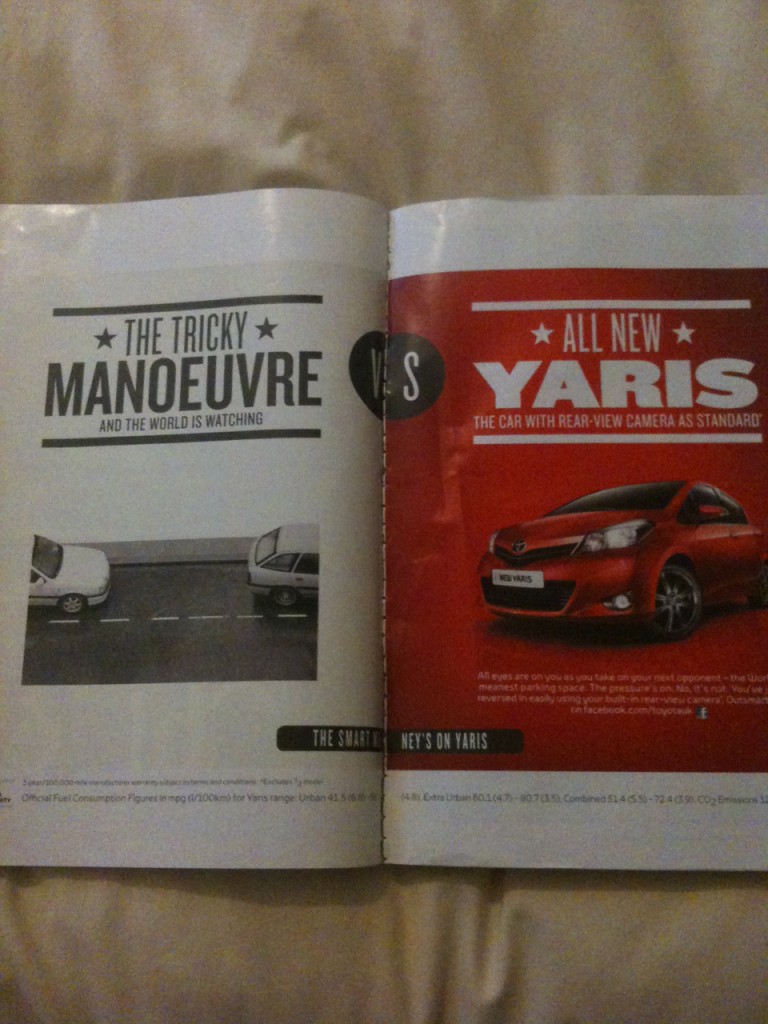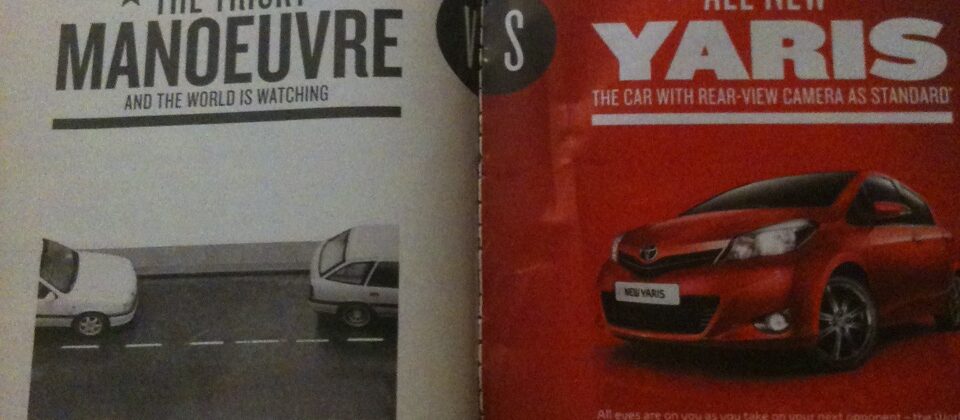I wasn’t going to blog this week. I am taking a week off to do some “strategy” planning.
I’d like to say this has involved long walks, yoga, museum trips and whiteboard brainstorming sessions.
Instead, I’ve driven my new car 3 times (bursting into tears 2 of those 3 occasions), watched a lot of Gilmore Girls, films, the entire series of Jekyll, played darts on the new dartboard (Amy 2 – Malc 0), and slept. A lot.

It’s been 3 years since I’ve had a holiday so I’m letting my body and head take some time off to run around and play.
After reading James Altucher’s blog this morning, today, my head wanted to write a blog post.
An honest post about what people (especially your friends) WON’T tell you about your sales page, business leaflet, brochure, or website.
People like to please other people which is why we don’t give difficult feedback like:
- I don’t get it – what’s it about?
- It’s boring
- It’s funny, but I don’t want to buy it
- It’s insulting
- It’s…all about you…
So here we go:
1: Nobody Wants Your Product
I used to think that if you did what you loved, you could make a business out of it. My brother stumped me with this:
I want to sit in my room, never talking to anyone else and playing my guitar all day. But never in front of people. And that’s all I want to do. Can I make a business out of that?
No.
It’s easier than ever to set up a website, offer a product, put your services for sale without actually thinking:
- Do people want this?
- Is it really any good?
Sales copy is not magic. If you are selling something that is rubbish and no-one wants, no good copywriter can make it sell (bad copywriters might sell it by lying, but you don’t want a bad copywriter).
Find out if people want what you have. For example send an email to your list.
Don’t worry about your list not being big enough.
If they are interested you’ll get feedback (or people will buy it).
When I launched my first little eBook I had about 70 people on my list.
I sold 50 copies (the sales copy definitely helped).
I didn’t know this was unusual for a small promotion and never really celebrated it (later Pam Slim would tell me to celebrate every single step and sale. I’m still trying to do that).
If you’re nervous, sell a smaller version of the big product. If people part with their money for it, it’s a good indication that you’re onto something good.
2. You have no other marketing
A lady asked for free advice recently. She told me her target market were “lazy,” weren’t trying and needed “a kick up the arse” (hint – never write copy for people who don’t like their customers – there’s enough awesome people out there who love their customers).
She asked me:
“Can a sales page sell this product?”
I asked how much it cost
“£6,000” (around $10,000)
Do you have a large email list?
“No”
Are you well known in your industry?
“No”
Do you have a large number of affiliates who will promote this?
“No”
What promotion are you doing to get people to the sales page?
“I might do a free call”
Answer:
A sales page alone will not sell a £6,000 product from an unknown with no other marketing.
A sales page is not magic. It is a place to show your expertise, reinforce credibility, make people like you and persuade people to take action by tapping into logic and emotions.
If you don’t feel a compulsion to spread your message about how you can help people, and you don’t want to hire a department to do that for you, your business probably isn’t going to work.
(Note – a sales page could generate you leads for this product, it could get people talking, and a longer campaign could get you sales, but this lady wanted to pop up a sales page and make £6,000 sales straight away with no other marketing)
3: You expect to get it right without writing
If you want to be good at anything you have to do that thing over and over again.
- If you play the mandolin you build calluses by playing the mandolin (Amy – go practice)
- If you want to run a marathon, lace up your trainers (7 months to go Ayms)
- If you want to write good copy you have to write. Period.
If you don’t want to hire a copywriter (not everyone should), practice on the little things before you try and sell the big stuff. Practice in your email newsletters (you’re sending one regularly right?), practice on your blog, practice by making small offers, but write.
Don’t expect that you can read about it and then go out and do it.
Read a little, practice a lot.
And never self-edit the first draft. Just let it flow.
Expect it to read like the unconscious mental stream of a sociopath (that way you’ll be pleasantly surprised when you go to edit it).
4. Details kill you
Writing your own sales copy is like pulling teeth because you have to spell out all those little details that you live and breathe but that your audience has no idea about.
Don’t be lazy.
Put in all the details so that people know what they heck it is you’re selling.
5.You are worried about writing “properly”
Ditch the writing voice you picked up in school.
Spelling, grammar, punctuation.
Yes they are important, but people don’t buy based on the correct use of grammar.
They buy based on whether they have “felt” anything.
I once told someone jokingly that even as a copywriter, I didn’t really know how to use a semi-colon.
She looked horrified and embarrassed for me.
I felt embarrassed at the time. Now less so.
The last sales page I wrote had nary a semi-colon anywhere near it.
My English teacher would have hated it.
But it helped make over $60,000 so my client was thrilled and I was pleased as punch too.

Great article Amy! I truly enjoy your charismatic and enthusiastic writing style and I look forward to your articles whenever I read them! Yes, life is hard these days when money is concerned and yes indeed people are entirely to superficial and full of you know what.
I hardly ever see people touching down on this particular truth in regards to our peers. Me personally, I don’t sugar coat things for people. If it’s bad it’s bad if it’s good it’s good and the in between will always be …well, the in between!
Regardless of what it may be I think that it is our responsibility as individual to be honest to one another when our opinion is asked. My personal experiences in life are that more harm than good comes from being polite in lieu of honest in the long run when we fail to be honest with one another.
My 2cents anyway!
Campbell
Hey Campbell! Thank you for your comment. Giving and receiving honest feedback is loaded with potential problems which is why people shy from it. Much easier to say something is fine then to admit that you don’t like or understand what is being sold. As the writer, I think the responsibility is on you to seek out honest feedback. The fortunate thing with copywriting is that your results are a great indication of if your’e on the right track. If your ideal clients are responding as you want them to, it doesnt’ matter what other people think. 🙂
Erk! Use ONE, not use ON!
Semi-colons are for English teachers, not real people. Every time I’m tempted to use on, I stick in a dash instead – much more conversational.
Great post, thanks. You’re giving me confidence that I really *can* do it – with practice. 🙂
Ah, the beloved dash – a lovely little pause for effect. 🙂 Way sexier than the stuffy semi-colon in my opinion.
And you really can do it LaVonne. 🙂
Great article but did your spell-checker go on holiday and not come back ? (persaude / logicand / regualrly)
Steve
I do that to see who’s really paying attention… 😉
I loved this! These were all very good tips.
I especially liked the last tip. So many people forget to put any PERSONALITY into their writing!
Keep up the great work! Love reading your posts!
Hey Lauren! Thanks for the comment, if you’re selling something tied in with who you are such as a course, your personality is definitely a selling point you don’t want to bury.
🙂